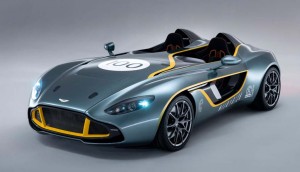
The retro-futuristic Aston Martin CC100 concept could hint at ideas the new partners will develop into future products for the British maker.
Two classic European luxury makers, Mercedes-Benz and Aston Martin, have decided to team up in a deal with wide-ranging opportunities. They’ve signed a letter of intent to work together on a new technical partnership and hope to have the final papers signed by year-end.
The move could prove a critical one for Aston Martin, the British-based maker that is struggling to define its future even as it celebrates its centenary. The announcement of the new deal raises as many questions as answers, however, and could foretell an even broader alliance if the initial partnership work out.
“We are proud to work with Aston Martin,” said Ola Kallenius, the head of Mercedes-AMG GmbH, the high-performance arm of Mercedes-Benz.
Under the new partnership, AMG will provide Aston with some of its powertrains and electrical systems, while the British maker also will gain access to other Mercedes performance technologies. Significantly, the Germans appear to positioned to take a role in the development of future products from Aston Martin.
“Aston Martin sources cutting-edge technology from key suppliers around the globe and the opportunity to include content from AMG in our next-generation sports cars is, clearly, good news,” proclaimed Aston Martin production development boss Ian Minards.
In turn, Daimler AG, the parent of Mercedes and AMG, will take a 5% non-voting stake in Aston Martin.
(Aston Martin introduces its fastest convertible ever, the 2014 Vanquish Volante. Click Here for a closer look.)
The news is clearly a big deal for Aston Martin which has been struggling since it was sold off by Ford a few years back to a consortium of primarily Kuwaiti investors. Along with Investment DAR, Adeem Investment, Italian firm Investindustrial – which recently sold its Ducati brand to Audi – holds a stake in Aston.
The British marque is in the midst of a grand centenary that has seen some major exhibitions of historic vehicles in Europe and the U.S., including one recent gathering claimed to be the largest ever collection of Astons in one place. But while many may regale in Aston Martin’s past, it’s the future some fans worry about.
Though the marque has revealed a number of ideas about where it is going – such as the CC100 Speedster concept –and has unveiled several new products in recent months, including the 2014 Vanquish Volante convertible, there have been growing doubts about its ability to continue developing competitive products and, in particular, powertrains on its own.
(First look: Aston Martin CC100 Speedster concept. Click Here.)
The nascent alliance with Mercedes could quickly supply Aston with competitive engines and help it find the resources needed to turn out new products, as well. In particular, it will have a well-funded partner to tap for electrical components. Considering the breadth of digital technologies expected of a modern luxury vehicle, that is no small development.
But going forward, might Mercedes seek to take an even bigger stake in Aston, a well-placed source asked?
This isn’t the first time the two makers have apparently discussed their options to work together. Just two years ago, they were reportedly discussing the possibilities of pairing up on future products, possibly teaming Daimler’s now-abandoned Maybach division with a revival of Aston’s Lagonda badge.
With the partnership still in the early stages, Daimler and Aston officials suggest they will have more specific details to announce in the months ahead.

This is a bit of an odd alliance as Aston takes a lot of pride in their ability to independently engineer a very fine automobile.
While is is true, Jorge, that much of Aston’s pride is in their independent engineering, it is also true that they lack the ability – engineering, personnel, and capital – to independently produce the sophisticated electronics that are becoming de rigeur in modern automobiles. And Aston’s experience in working with carbon fiber may be something that AMG and Daimler can benefit from.
Can anyone remember any integrated manufacturer that long stayed in business, once it started buying some other company’s engines?
That’s becoming increasingly popular, actually. Even Toyota is sourcing diesel engines from BMW for Europe. There is a price penalty but for a maker without the know-how, capacity or economies of scale this may become unavoidable going forward.
Paul A. Eisenstein
Publisher, TheDetroitBureau.com
I didn’t explain myself correctly. I meant purchase what I suppose might be called “main line” engines. Toyota’s use of diesels in Europe is somewhere south of 1% of total Toyota revenue. Performance engines for a company like Aston are bread-and-butter. When you put a Ford smallblock in an AC Ace, it’s not an AC anymore.